Written with love, shared with joy.
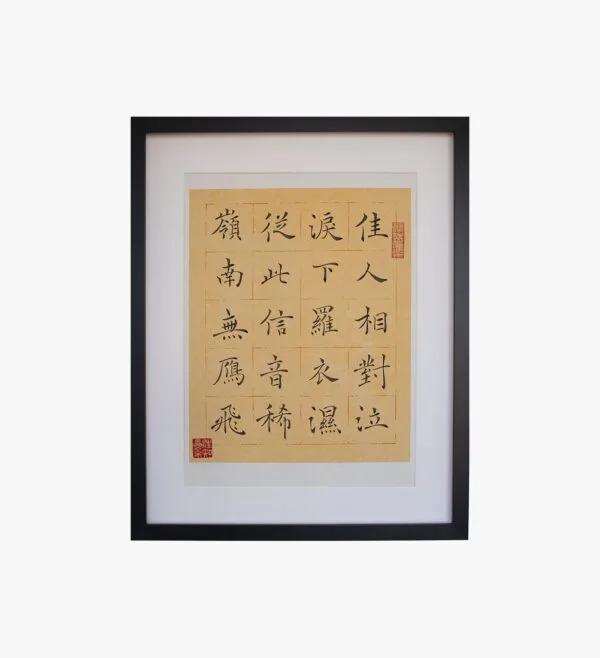
Handwritten Chinese Calligraphy Wall Hanging with Li Shizhong Farewell Poem
$220.00
This exquisite Chinese calligraphy wall hanging with farewell poem by Li Shizhong captures the tender sorrow of parting, beautifully expressed in the final lines of his evocative “Bodhisattva Barbarian.”
Adorned with my personal signature and leisure seals, this artwork invites you to reflect on the bittersweet emotion of farewells.
- Materials: Handmade calligraphy on premium rice paper with an antique finish.
- Design: Soft yellow background with an antique tone complements the historical and cultural significance of the poem.
- Calligraphy: Features Li Shizhong’s poetic line, handwritten using traditional brush techniques.
- Seals: Stamped with the artist’s personal name seal and leisure seal for authenticity.
- Dimensions: 40 cm x 50 cm.
This wall-hanging artworks comes with the IKEA RÖDALM black frame by default. If you prefer a white frame, please specify your preference in the Order Notes section at checkout.
The Meaning and Origin of the Words
This elegant calligraphy wall hanging with farewell poem by Li Shizhong features the final four lines of the renowned poem “Bodhisattva Barbarian” (《菩萨蛮》). With its soft yellow background and antique-inspired design, this wall hanging with farewell poem offers a poignant glimpse into the beauty of classical Chinese poetry:
“佳人相對泣,淚下羅衣濕。
從此信音稀,嶺南無雁飛。”
Translation:
“The beautiful one weeps before me, her tears soaking her silk robe.
From now on, letters will be rare—no geese fly south to Lingnan.”
The scene begins with two lovers facing each other, overcome with sorrow as they part ways. The tears of the “佳人” (the beautiful one) fall so freely that they soak her delicate silk garment, an image that emphasizes the raw intensity of her emotions. The physical detail of wet silk vividly conveys the depth of their pain, grounding the abstract idea of sorrow in a tangible, relatable moment.
The final couplet introduces the poignant metaphor of the migratory geese, traditionally seen in Chinese literature as messengers of love and longing. Geese flying south often symbolized the delivery of letters or the possibility of staying connected despite physical separation. In this poem, however, “岭南无雁飞” (no geese fly south to Lingnan) conveys a heartbreaking sense of finality. Lingnan, a region in southern China, becomes a metaphor for distance and isolation. The absence of geese suggests not only the impossibility of communication but also the emotional chasm that separation creates.
This line subtly shifts the tone from a personal lament to a broader commentary on the inevitability of disconnection, making the poem resonate beyond the specific context of the lovers.
At its core, the poem is a deeply emotional exploration of parting. On the surface, it expresses the immediate grief of two lovers forced apart, but beneath this lies a profound meditation on the fragility of human connections. The soaked silk and the silent skies reflect the helplessness that often accompanies such moments, where external forces dictate the course of relationships, leaving individuals powerless to resist.
This dual-layered sorrow—personal loss and existential reflection—is a hallmark of Li Shizhong’s poetic style. The restrained language allows readers to feel the depth of the emotion without being overwhelmed by sentimentality.
The poem’s use of migratory geese reflects the deep connections between Chinese poetry and nature. Birds, rivers, and the moon often serve as metaphors for human emotions, bridging the physical and spiritual realms. In this case, the geese symbolize both hope and its absence, encapsulating the bittersweet reality of separation.
What makes this poem timeless is its exploration of universal themes. The act of parting, the longing for connection, and the inevitability of silence are experiences shared across cultures and eras. Li Shizhong’s delicate imagery—tears soaking silk, geese absent from the sky—offers a poetic lens through which we can examine our own experiences of loss and longing.
The poem also speaks to the resilience of love. Even in separation, the act of remembrance and the intensity of emotion affirm the strength of the bond between the lovers. While the absence of communication underscores their physical distance, the shared sorrow binds them in an unspoken unity.
About the Poet
Li Shizhong, a Song Dynasty poet, was celebrated for his ability to convey profound emotions with elegance and subtlety. His works often reflect the personal struggles and the melancholy beauty of human relationships, capturing moments of intimacy, longing, and separation. The restrained yet powerful language in “Bodhisattva Barbarian” exemplifies his poetic genius, blending vivid imagery with deep emotional resonance.
Why Choose This Wall Hanging with Farewell Poem?
Owning this wall hanging means more than just having a decorative item; it’s an invitation to explore the rich emotional world of Song Dynasty poetry. The delicate brushwork, combined with the timeless message of love and longing, makes this piece a meaningful and unforgettable addition to any home or art collection.
Bring this timeless treasure into your home and let it inspire you every day!
| Weight | 1.29 kg |
|---|---|
| Dimensions | 3 × 40 × 50 cm |
Only logged in customers who have purchased this product may leave a review.


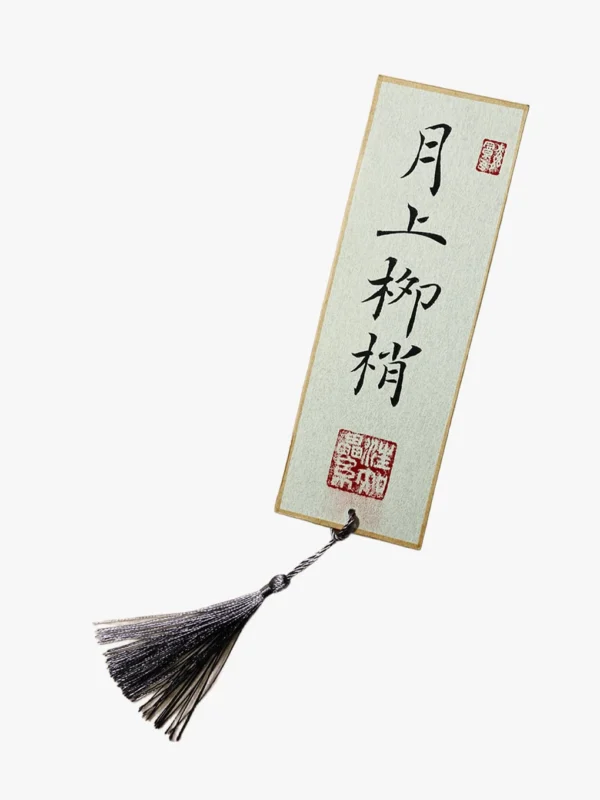
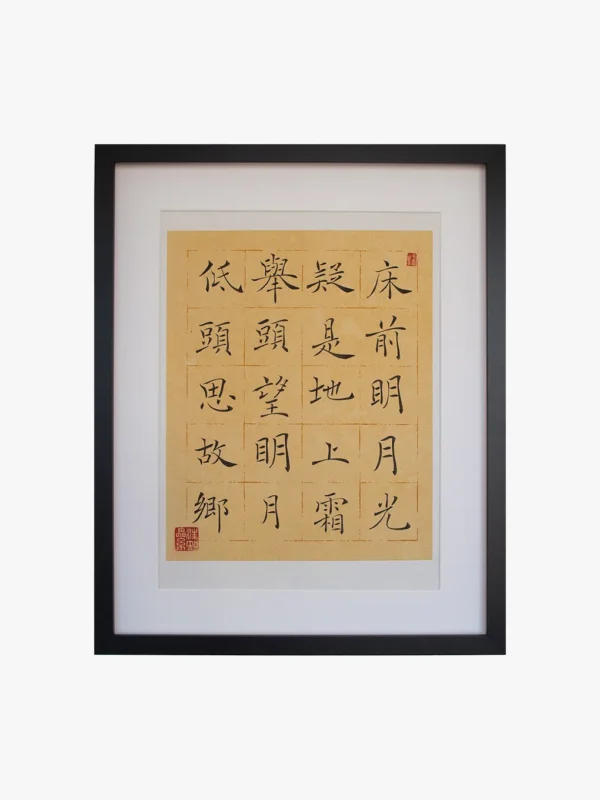
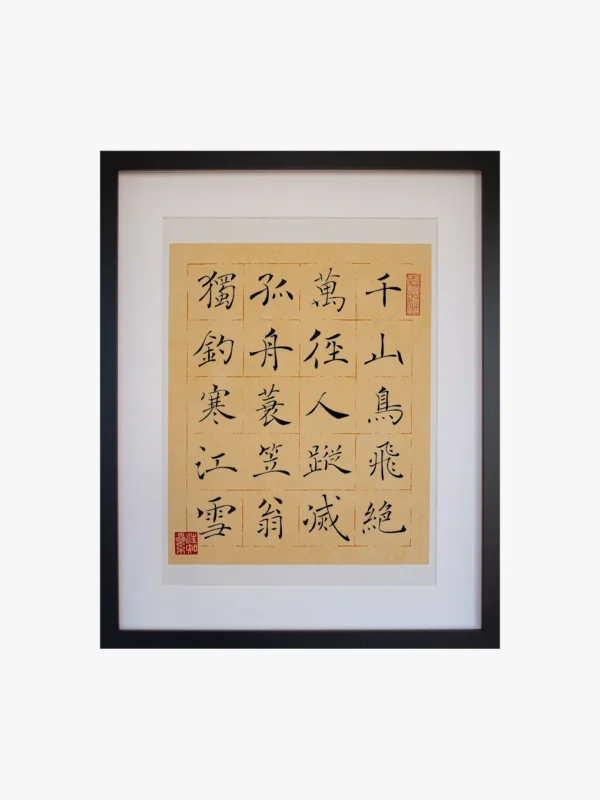
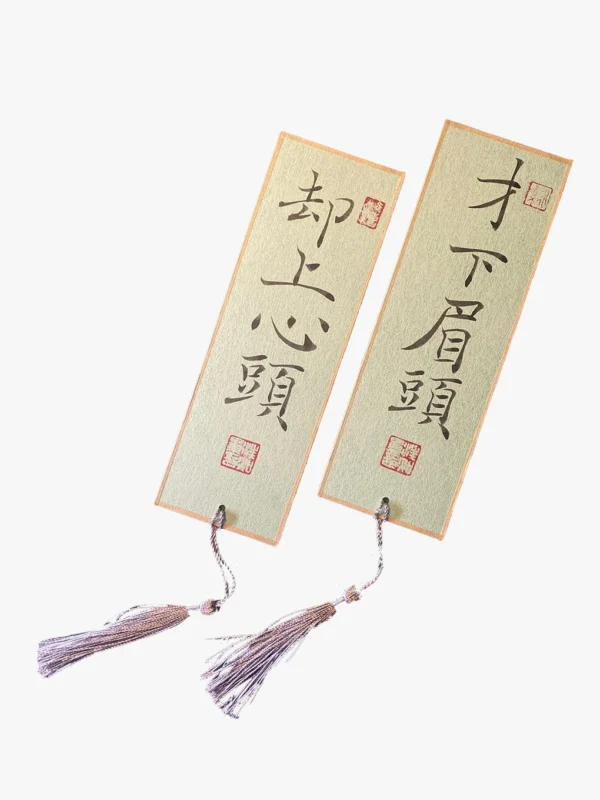
Reviews
There are no reviews yet.